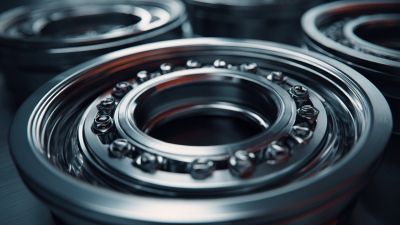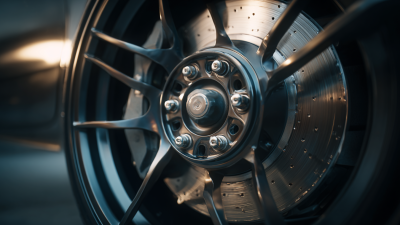Discover the Essential Car Pieces Every Vehicle Owner Should Know About
Understanding the fundamental components that make up a vehicle is essential for every car owner, not only for maintenance but also for enhancing safety on the road. According to the Automotive Industry Association, a staggering 72% of vehicle breakdowns are attributed to issues related to specific car pieces that owners often overlook. With over 270 million registered vehicles in the United States alone, knowing the critical car pieces—such as the brake system, engine components, and electrical systems—can significantly impact vehicle longevity and performance. Moreover, the National Highway Traffic Safety Administration indicates that inadequate knowledge of automobile parts can lead to safety hazards, highlighting the importance of being informed. By familiarizing themselves with these essential car pieces, vehicle owners can make informed decisions, ensure their vehicles are in optimal condition, and ultimately enjoy a safer driving experience.

Essential Engine Components Every Vehicle Owner Should Understand
Understanding essential engine components is crucial for every vehicle owner, as these parts are the backbone of vehicle performance and longevity. A report by the Automotive Aftermarket Industry Association (AAIA) highlights that nearly 75% of vehicle maintenance issues stem from the engine and its associated systems. Key components such as the ignition system, fuel injectors, and cooling systems play vital roles in ensuring optimal engine function. For instance, a properly functioning ignition system ignites fuel efficiently, enhancing fuel economy and reducing harmful emissions, which is increasingly vital given that vehicles account for approximately 29% of total greenhouse gas emissions in the United States.

Another essential piece is the oil filter, which, according to a study by the Society of Automotive Engineers (SAE), can significantly influence engine performance and longevity. Regularly changing the oil filter helps prevent harmful contaminants from circulating within the engine, thereby reducing wear and increasing efficiency. Furthermore, understanding the cooling system, including the radiator and thermostat, is essential as it maintains optimal engine temperatures. Overheating is one of the leading causes of engine failure, with the AAIA reporting that coolant system issues account for nearly 15% of all vehicle breakdowns. By familiarizing yourself with these components, you can not only improve your vehicle's performance but also extend its lifespan.
Key Electrical Parts and Their Functions in Modern Vehicles
When it comes to understanding your vehicle, knowledge of key electrical parts is crucial for every car owner.
Modern vehicles rely on an intricate network of electrical systems to function optimally, encompassing everything from ignition to communication between various components. Among the essential parts are the battery, alternator, and starter motor.
The battery provides the necessary power to start the engine and run electrical accessories when the engine is off, while the alternator keeps the battery charged by converting mechanical energy into electrical energy when the engine is running. The starter motor engages the engine's flywheel, initiating the combustion process.
Tips: Regularly inspect your battery for corrosion. Keeping the terminals clean can help maintain a reliable electrical connection. Additionally, pay attention to any signs of dimming lights or engine stalling; these might indicate issues with the alternator.
Another crucial component is the fuse box, which safeguards your vehicle's electrical circuits from overload. Understanding how to locate and replace a blown fuse can save you from costly repairs. Familiarizing yourself with the dashboard indicators that signal electrical malfunctions—such as a battery warning light—can also be beneficial, ensuring you address any issues before they escalate.
Understanding Your Vehicle's Transmission System: What to Know
The transmission system is a critical component of any vehicle, playing a vital role in how power is transferred from the engine to the wheels. Understanding the basics of your vehicle's transmission can empower you as an owner, helping you to identify potential issues and ensure smoother operation. There are two main types of transmission systems found in vehicles: manual and automatic. Each has its unique features and maintenance requirements.
Manual transmissions require the driver to change gears by hand using a clutch pedal, which can enhance the driving experience for those who appreciate more control over their vehicle. On the other hand, automatic transmissions use a complex system of gears and hydraulics to shift gears on behalf of the driver, offering convenience, especially in stop-and-go traffic. Knowing how to check transmission fluid levels and recognizing warning signs, such as slipping gears or unusual noises, can help maintain the longevity of your vehicle’s transmission system and prevent costly repairs.
Discover the Essential Car Pieces Every Vehicle Owner Should Know About - Understanding Your Vehicle's Transmission System: What to Know
| Component | Function | Common Issues | Maintenance Tips |
|---|---|---|---|
| Transmission Fluid | Lubricates and cools the transmission | Low fluid levels, overheating | Check levels regularly; replace every 30,000 miles |
| Transmission Filters | Removes contaminants from transmission fluid | Clogs can cause shifting problems | Replace every 15,000 to 30,000 miles |
| Torque Converter | Transfers power from the engine to the transmission | Slipping or overheating | Ensure fluid is at proper levels |
| Shifter | Allows driver to select gears | Difficulty in shifting or sticking | Keep it clean and lubricated |
| Clutch (Manual) | Engages and disengages the engine from the transmission | Slipping, stiff pedal | Avoid riding the clutch; replace when worn |
The Importance of Suspension and Brake Systems in Vehicle Safety
The suspension and brake systems are fundamental components that significantly affect vehicle safety. A well-designed suspension system not only provides a smooth ride but also plays a crucial role in maintaining control of the vehicle, especially during sudden maneuvers or adverse weather conditions. It works by absorbing shocks from the road, ensuring that the tires remain in contact with the surface for optimal traction. This connection is vital for effective steering and stability, preventing dangerous situations that could lead to accidents.
Equally important, the brake system is the primary mechanism for halting a vehicle safely and quickly. Modern brake systems utilize advanced technology, including anti-lock braking systems (ABS), which help prevent wheel lock-up during hard braking, thus allowing drivers to maintain control. Regular inspection and maintenance of both the suspension and brake systems are essential for ensuring that these components function correctly.
Neglecting them can lead to dangerous driving conditions, increasing the risk of collisions and endangering the lives of both the driver and others on the road.
Understanding these essential car pieces empowers vehicle owners to prioritize safety and make informed decisions regarding maintenance and repairs.
Essential Fluids and Filters Every Car Owner Must Monitor
Every vehicle owner must prioritize the maintenance of essential fluids and filters to ensure their car operates smoothly and efficiently. According to the Automotive Maintenance and Repair Association (AMRA), neglecting fluid checks can lead to serious mechanical issues, potentially costing vehicle owners between $500 to $1,200 in repairs annually. The four key fluids to routinely monitor include engine oil, transmission fluid, coolant, and brake fluid. Each plays a vital role in the vehicle's performance and longevity.
Tips: Check your engine oil every month. Dark, dirty oil can indicate that it needs to be changed, while low levels require immediate attention to avoid engine damage. Keeping the coolant at appropriate levels is equally crucial; insufficient coolant can lead to overheating, which can ruin your engine.
Filters are just as critical as fluids. The oil filter, air filter, and fuel filter all contribute to the optimal functioning of your vehicle. According to the Consumer Reports’ Automotive Survey, regularly changing these filters can improve fuel efficiency by up to 10%. Dirty filters not only strain the engine but can also lead to reduced performance.
Tips: Aim to replace the air filter every 15,000 to 30,000 miles and check the oil filter whenever you change your oil. Keeping these parts clean ensures proper airflow and fluid circulation, helping your vehicle run efficiently for years to come.

Related Posts
-

The Hidden Role of Car Bearings in Ensuring Smooth and Safe Driving
-

Exploring Key Car Factors: How They Influence Your Vehicle’s Performance and Value
-

Ultimate Guide to Choosing the Best Brake Parts for Your Vehicle
-

Understanding the Role of Car Distributors: Your Guide to a Smooth Automotive Supply Chain

